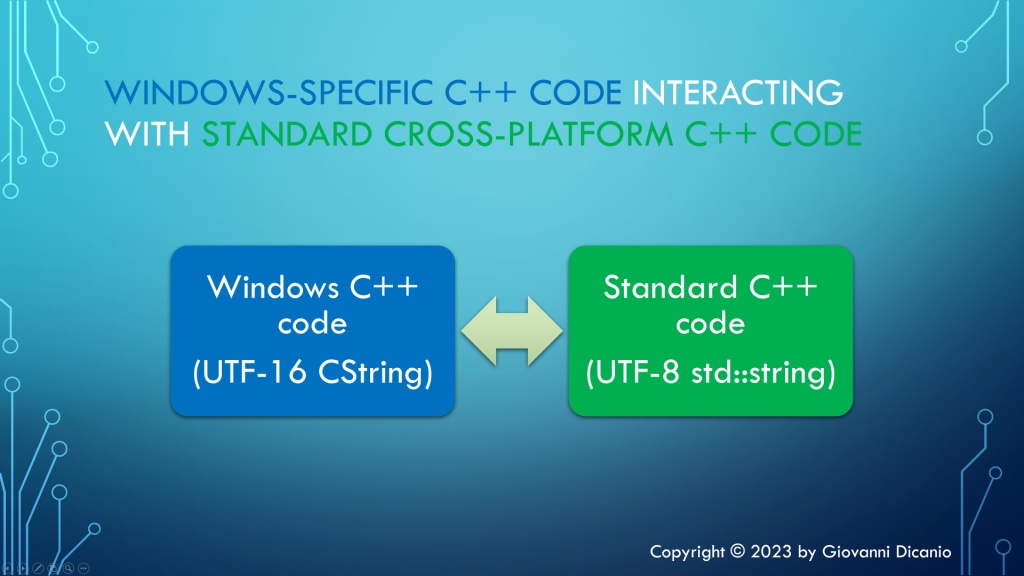In previous blog posts of this series we saw how to convert between Unicode UTF-16 and UTF-8 using ATL/MFC’s CStringW/A classes and C++ Standard Library’s std::wstring/std::string classes.
In this post I’ll discuss another interesting scenario: Consider the case that you have a C++ Windows-specific code base, for example using ATL or MFC. In this portion of the code the CString class is used. The code is built in Unicode mode, so CString stores Unicode UTF-16-encoded text (in this case, CString is actually a CStringW class).
On the other hand, you have another portion of C++ code that is standard cross-platform and uses only the standard std::string class, storing Unicode text encoded in UTF-8.
You need a bridge to connect these two “worlds”: the Windows-specific C++ code that uses UTF-16 CString, and the cross-platform C++ code that uses UTF-8 std::string.

Let’s see how to do that.
Basically, you have to do a kind of “code genetic-engineering” between the code that uses ATL classes and the code that uses STL classes.
For example, consider the conversion from UTF-16 CString to UTF-8 std::string.
The function declaration looks like this:
// Convert from UTF-16 CString to UTF-8 std::string
std::string ToUtf8(CString const& utf16)
Inside the function implementation, let’s start with the usual check for the special case of empty strings:
std::string ToUtf8(CString const& utf16)
{
// Special case of empty input string
if (utf16.IsEmpty())
{
// Empty input --> return empty output string
return std::string{};
}
Then you can invoke the WideCharToMultiByte API to figure out the size of the destination UTF-8 std::string:
// Safely fail if an invalid UTF-16 character sequence is encountered
constexpr DWORD kFlags = WC_ERR_INVALID_CHARS;
const int utf16Length = utf16.GetLength();
// Get the length, in chars, of the resulting UTF-8 string
const int utf8Length = ::WideCharToMultiByte(
CP_UTF8, // convert to UTF-8
kFlags, // conversion flags
utf16, // source UTF-16 string
utf16Length, // length of source UTF-16 string, in wchar_ts
nullptr, // unused - no conversion required in this step
0, // request size of destination buffer, in chars
nullptr, // unused
nullptr // unused
);
if (utf8Length == 0)
{
// Conversion error: capture error code and throw
...
}
Then, as already discussed in previous articles in this series, once you know the size for the destination UTF-8 string, you can create a std::string object capable of storing a string of proper size, using a constructor overload that takes a size parameter (utf8Length) and a fill character (‘ ‘):
// Make room in the destination string for the converted bits
std::string utf8(utf8Length, ' ');
To get write access to the std::string object’s internal buffer, you can invoke the std::string::data method:
char* utf8Buffer = utf8.data();
ATLASSERT(utf8Buffer != nullptr);
Now you can invoke the WideCharToMultiByte API for the second time, to perform the actual conversion, using the destination string of proper size created above, and return the result utf8 string to the caller:
// Do the actual conversion from UTF-16 to UTF-8
int result = ::WideCharToMultiByte(
CP_UTF8, // convert to UTF-8
kFlags, // conversion flags
utf16, // source UTF-16 string
utf16Length, // length of source UTF-16 string, in wchar_ts
utf8Buffer, // pointer to destination buffer
utf8Length, // size of destination buffer, in chars
nullptr, // unused
nullptr // unused
);
if (result == 0)
{
// Conversion error: capture error code and throw
...
}
return utf8;
I developed an easy-to-use C++ header-only library containing compilable code implementing these Unicode UTF-16/UTF-8 conversions using CString and std::string; you can find it in this GitHub repo of mine.
One thought on “Converting Between Unicode UTF-16 CString and UTF-8 std::string”